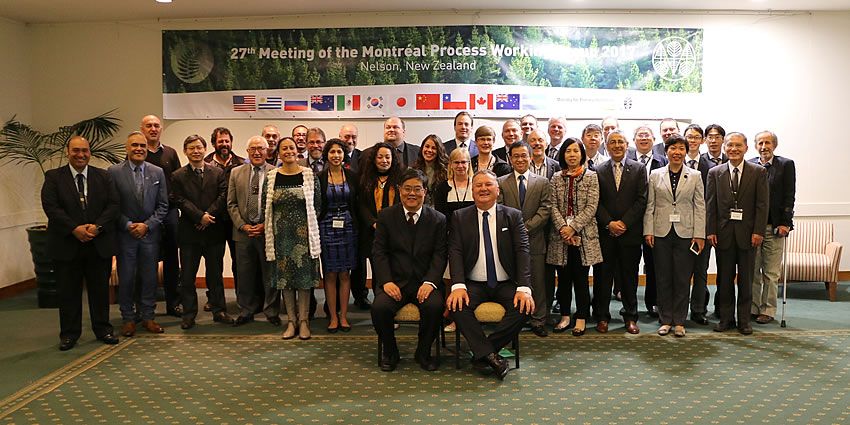Twenty-seventh Montréal Process Working Group Meeting
Nelson, New Zealand
14-17 November 2017
The Montréal Process Working Group on Criteria and Indicators for the Conservation and Sustainable Management of Temperate and Boreal Forests held its 27th meeting in Nelson, New Zealand, November 14 to 17, 2017. The meeting included approximately 25 participants from 6 Montréal Process member countries (Canada, Chile, China, Japan, New Zealand, and the United States of America) and invited representatives from Forest Europe, FAO and ITTO.
 27th Montreal Process Working Group Meeting attendees.
27th Montreal Process Working Group Meeting attendees.
The Working Group was welcomed in a mihi whakatau (a Māori greeting) by representatives from seven local iwi (groups of Māori tribes). In New Zealand, Māori are not only kaitiakitanga (guardians) of New Zealand’s forests, but Māori Iwi are also major land owners and are increasingly production forest owners.
The Honourable Mr. Shane Jones, New Zealand’s Minister of Forestry, welcomed the participants and briefly introduced the development of, and progress on, sustainable forest management in New Zealand. This included the initiative to plant 1 billion trees over the next 10 years which will contribute to regional economic development and assist New Zealand to meeting its climate change obligations under the Paris Agreement. He encouraged the Working Group to share knowledge and learn from each other in order to pass knowledge on to the future generations, outlining how in New Zealand, lessons on sustainable forest management have been learnt the hard way.
The meeting had many highlights and important outcomes. Courteney Sealey, Ph. D candidate at the Ngāi Tahu Research Centre, University of Canterbury, gave a presentation on cultural indicators. Courteney provided some perspectives from her research on Indigenizing Sustainable Forest Management Frameworks. The Working Group members finalised a communications plan and a comprehensive package of actions to advance the future direction of the Montreal Process, culminating in a plan to form a Synthesis Report on criteria and indicators for temperate and boreal forests to be published to coincide with the 2021 World Forestry Congress in Korea.
The meeting also featured a one-day field trip around the Nelson region that showcased both New Zealand’s planted forestry industry, and the indigenous (natural) forest estate and some of the work being done to conserve biodiversity within these forests.
Participants left the meeting with a renewed energy for future work under the Montreal Process banner, and a warm open invitation to return to New Zealand and explore more of the country and its forests.
Aide Memoire
- Aide-Memoire (PDF, 810 KB)
- Annex A - 27th Montréal Process Working Group Meeting Agenda (PDF, 158 KB)
- Annex B - List of participants (PDF, 398 KB)
- Annex C - Report on CFRQ (PDF, 185 KB)
- Annex D - Communications plan (PDF, 504 KB)
- Annex E - Future strategic direction (PDF, 664 KB)
- Annex F - Country experiences of SFM (PDF, 672 KB)
- Annex G - TAC Convenor report (PDF, 1.2 MB) PowerPoint (1.7 MB)
- Annex H - TAC Convenor Draft Overview and Achievement report for feedback (PDF, 1.4 MB)
- Annex I - Revised Terms of Reference (PDF, 372 KB)
